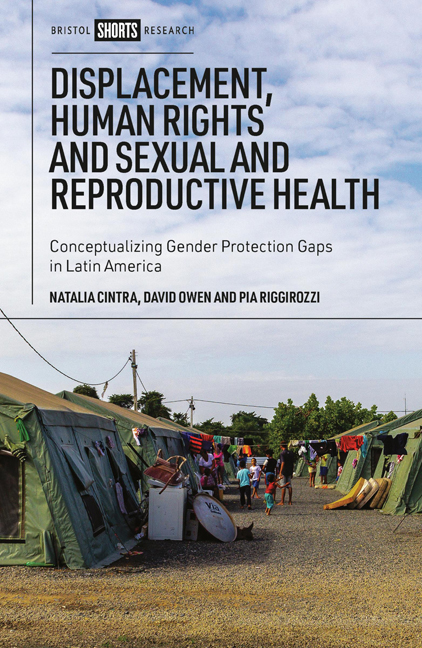 Displacement, Human Rights and Sexual and Reproductive Health
Displacement, Human Rights and Sexual and Reproductive Health Book contents
- Frontmatter
- Dedication
- Contents
- List of Figures and Tables
- Acknowledgements
- Introduction
- One The Gendered Character of Forced Migration
- Two Problematizing the Migrant– Refugee Distinction in Latin America
- Three Latin American Normative Frameworks of Migration and Asylum
- Four Protecting the Human Right to Health of Women and Girls from Venezuela as Necessary Fleers
- Five Responsibility and the Ethics of Forced Displacement in South America
- Conclusion
- Notes
- References
- Index
Four - Protecting the Human Right to Health of Women and Girls from Venezuela as Necessary Fleers
Published online by Cambridge University Press: 18 January 2024
- Frontmatter
- Dedication
- Contents
- List of Figures and Tables
- Acknowledgements
- Introduction
- One The Gendered Character of Forced Migration
- Two Problematizing the Migrant– Refugee Distinction in Latin America
- Three Latin American Normative Frameworks of Migration and Asylum
- Four Protecting the Human Right to Health of Women and Girls from Venezuela as Necessary Fleers
- Five Responsibility and the Ethics of Forced Displacement in South America
- Conclusion
- Notes
- References
- Index
Summary
When women and girls reach their countries of destination, issues of documentation matter, both in how they experience their (health) rights in their everyday circumstances, but also in how they perceive themselves and are socially perceived as rights-holders. Even in contexts where documentation does not seem to be a problem for accessing basic rights, such as healthcare, women can be ‘socially undocumented’. According to Amy Reed-Sandoval (2020: 36), ‘socially undocumented identity is an ethno-racial and class identity, and the social group of socially undocumented people includes people with and without legal authorization to live in the country where they currently reside’. This means that whether necessary fleers are documented or not, gender, race, ethnicity and class can intersect with their migrant status in affecting their everyday experiences of rights as they are socially seen or thought of as undocumented. Everyday barriers associated with social perceptions and practices can affect women fleers’ enjoyment of rights independent of status. This is not to argue that documentation does not matter. Chapter 3 showed how documentation is used in migratory governance to make access to rights more or less difficult. This chapter will argue that, additionally, inequalities and injustices rise from intersecting variables, including gender, regardless of status. In other words, documentation matters for Venezuelans in the contexts analysed, but everyday gendered social experiences of rights are key in unfolding the importance of going beyond issues of documentation and status.
What will become clear is that displaced women and girls have their access to rights and dignity severely curtailed. One gender-sensitive area where this becomes apparent is in relation to sexual and reproductive health (SRH). SRH represents one of the bleakest experiences of gendered harms that affect women and girls’ rights, dignity and freedoms during displacement and beyond. Yet gender-sensitive systems of protection to address the challenges of sexual and reproductive health of women and girls in displacement are not always available, effective or willing to respond appropriately in upholding protection for all migrants.
In this chapter we focus attention on displaced women and girls as necessary fleers in order to detail the ways in which their experience of displacement shapes their SRH and access to SRH rights. We develop this chapter based on the many interviews and discussions we had during fieldwork, giving voice to displaced women and girls.
- Type
- Chapter
- Information
- Displacement, Human Rights and Sexual and Reproductive HealthConceptualizing Gender Protection Gaps in Latin America, pp. 89 - 116Publisher: Bristol University PressPrint publication year: 2023
